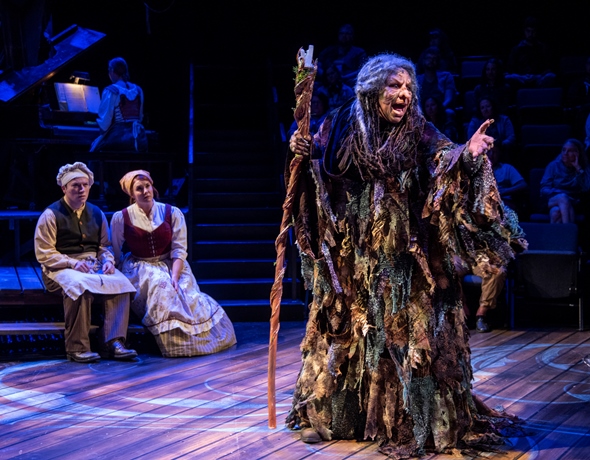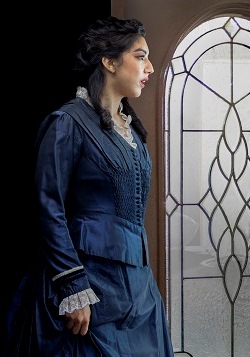Theater 2019-20: From woods to tennis court and date with Death, Writers plots a fresh trek

Bethany Thomas portrays the not-so-neighborly Witch in Sondheim’s “Into the Woods,” the 2019-20 season opener at Writers Theatre. (Michael Brosilow photo)
First in a series of season previews: After “Into the Woods” kickoff, it’s a distilled “Doll’s House,” more perspectives on modern society.
By Lawrence B. Johnson
Contemplating the diverse and intriguing 2019-20 series of plays underway at Writers Theatre artistic director Michael Halberstam sums up the challenge of programming and its progression from year to year. “I’d like to think we learn something every season,” he offers with unembroidered simplicity. “We want to be in tune with the times, to reflect the moment – to present a genuinely diverse season.”
Indicative of what Halberstam calls “new looks at canon-based plays,” the company’s second production puts something of a double twist on the Henrik Ibsen classic “A Doll’s House.” Not only will be the play be presented in a single-act distillation of 90 minutes’ duration, but it also will be housed — a particularly apt term — in the intimate confines of Writers’ 99-seat black box space rather than the comparatively grand 250-seat Nichols Theatre where one might expect to witness so august a drama.
“We are taking a hard look at reasons for reviving these pieces in these times,” Halberstam says. “We are constantly reassessing the relevance of the entire canon of plays written by white males in other times and defined by white European academics. Our audiences are open to fresh narratives.”
The 2019-20 season in brief:
- “Into the Woods,” music and lyrics by Stephen Sondheim, book by James Lapine. (Extended through Sept. 22): When a childless baker and his wife set out to lift their family curse by journeying into the woods, they encounter Jack (with his beanstalk), Cinderella (and her prince) and Little Red Riding Hood (and her wolf). These familiar characters find themselves in decidedly unfamiliar circumstances and must brave the darkness of the woods in an effort to break the curse, conquer their fears and find out if what they’ve always wished for is what they truly want. “The message here is ‘be careful of the things you say – children may be listening,” says Halberstam. “In the first half of ‘Into the Woods,’ the characters are acting rashly, in self-interested ways. But then they discover their actions have consequences that impact their community and their children.”
-
“A Doll’s House” by Henrik Ibsen, adapted by Michael Halberstam and Sandra Delgado. (Sept. 25-Dec. 15): This one-act adaptation of Ibsen’s classic drama consolidates the compelling story of vibrant young Nora Helmer, who is deeply devoted to her husband Torvald. However, all is not as it appears: When Nora takes action to protect her husband, she unwittingly puts them both in jeopardy, testing the bonds of their marriage and forcing them to take stock of their relationship and to ask themselves how well they truly know one another. Says Halberstam: “I had taken the play down to 90 minutes from two and a half hours, but then I brought in Sandra to add the wit and contemporary freshness my version was lacking. Boiled down to its essence, the play is still radical.”
- “The Niceties” by Eleanor Burgess (Nov. 6-Dec. 15): A prominent Ivy League professor holds office hours with an ambitious young student to discuss her thesis: If history is written by the victors, who tells the story of the oppressed? Before long, quibbles over semantics and Wikipedia citations turn into a fractious debate as both women passionately defend their perspective and their personal world view – until one of them puts everything on the line to make her case. “Here we have two generations of progressive thinkers, both women, one white and one black, clashing across everything that divides them,” says Halberstam. “Neither can break the other, and you feel your empathy and loyalty shift from one to the other. It’s emblematic of our time: two sides striving so hard to be right that they essentially refuse to really listen to each other.”
- “Stick Fly” Lydia R. Diamond (Feb. 5-March 15, 2020): What begins as a relaxing summer weekend on Martha’s Vineyard escalates when the LeVay brothers bring their new girlfriends home to meet their affluent and imposing parents. But even as the newcomers find themselves under familial scrutiny, long-hidden family tensions bubble to the surface and by the end of the weekend, almost everyone at the Vineyard comes under a microscope as they grapple with arguments about class, race and cultural expectations. “Much like an August Wilson play, systemic racism is the backdrop for characters who are just trying to live their lives,” says Halberstam. “Lydia invites you into conversations with her characters. It’s about how ghettoized a metropolis can become under the weight of systemic racism.”
-
“The Last Match” by Anna Ziegler (March 18-June 7): As a young Russian tennis phenom and an American superstar in his prime meet at center court, it’s a tough call whether the more intense drama is playing out on the court or off. As the swift action volleys between prime time tennis matches and the most pivotal moments in the personal lives of the competitors and their equally driven romantic partners, a sharply drawn and insightful narrative taps into the minds of all four as they confront sport, life and love. What results is a fast-paced montage exploring family, the sacrifices we make for success and the legacy we leave behind. “On the surface, the protagonists might seem to be the two tennis stars,” says Halberstam, “but it really goes in a different direction – as an incredibly sophisticated look at cultural misogyny. It’s about trying to maintain relationships, balancing work-life with family and always having to succeed. The tennis match becomes a metaphor.”
- “Mementos Mori,” created by Manual Cinema (May 6-June 14): When the persona of Death unexpectedly finds herself in California, she trades her scythe for an iPhone and wanders Hollywood, introducing unexpected connections into the otherwise disparate lives of a ghost, a young girl and an elderly projectionist. This intricate show uses multiple puppets, seven overhead projectors, two cameras and three screens to create a live “movie” for the audience. Accompanied by four musicians playing an original score, along with live Foley sound effects, “Mementos Mori” unfolds as a mosaic of cinematic storytelling. “This delightful play strikes a healthy balance between whimsy and provocation,” says Halberstam. “Death has traded in her scythe for an app, falls in love and begins to question her own métier. It isn’t escapism, but neither will it deflate you.”
Related Link:
- Official website of Writers Theatre: Go here




1 Pingbacks »